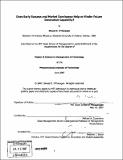Does early success and market dominance help or hinder future innovative capability?
Author(s)
O'Flanagan, Sinead E
DownloadFull printable version (5.658Mb)
Other Contributors
Management of Technology Program.
Advisor
Michael A. Cusumano.
Terms of use
Metadata
Show full item recordAbstract
Many successful innovative companies are acquired and become absorbed into larger more structured organizations. The innovation capabilities of the company change in the new environment depending on the extent to which they are nurtured or overridden. This thesis looks at one particular story of such an acquisition and follows its progress after it has been formally integrated into the acquiring company. More than five years after the acquisition the company's innovation is struggling, perhaps even more so in recent years. This thesis looks at the underlying causes of that struggle, the inflexibility of the larger more structured organization and the resistance of the acquired company, due to its earlier success, to adapt itself to the rigours of a larger company,. The thesis strives to answer the question: "Does early success and market dominance help or hinder future innovative capability?" The author worked with the acquired company, as a management consultant, for a four year period beginning shortly after the company was acquired. The culture then, was strikingly positive and very enjoyable to work in. It had an almost magnetic draw. (cont.) During the years that followed that culture began to be eroded and the atmosphere changed palpably as people struggled with the manner in which new systems and structures were being established. There was constantly a sense of being imposed on by the parent company rather than being support. That eventually took its toll on people and in recent years some key employees have left. Having stepped back from the organization, the author continues to reflect on what could have been done differently along with what can be done today to retain and restore some of that strong company creativity and innovativeness. The author's underlying purpose for doing this thesis, in addition to answering the research questions, is to reaffirm the belief that profitable, successful businesses and strongly held values can and should coexist.
Description
Thesis (S.M.M.O.T.)--Massachusetts Institute of Technology, Sloan School of Management, Management of Technology Program, 2007. Includes bibliographical references (p. 65).
Date issued
2007Department
Management of Technology Program.; Sloan School of ManagementPublisher
Massachusetts Institute of Technology
Keywords
Management of Technology Program.